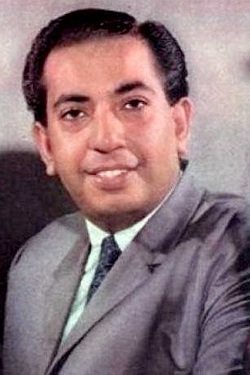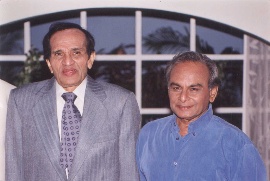Related Research Articles

Mohammed Rafi was an Indian playback singer and musician. He is considered to have been one of the greatest and most influential singers of the Indian subcontinent. Rafi was notable for his versatility and range of voice; his songs varied from fast peppy numbers to patriotic songs, sad numbers to highly romantic songs, qawwalis to ghazals and bhajans to classical songs. He was known for his ability to mould his voice to the persona and style of the actor lip-syncing the song on screen in the movie. He received six Filmfare Awards and one National Film Award. In 1967, he was honored with the Padma Shri award by the Government of India. In 2001, Rafi was honoured with the "Best Singer of the Millennium" title by Hero Honda and Stardust magazine. In 2013, Rafi was voted for the Greatest Voice in Hindi Cinema in the CNN-IBN's poll.

Mahendra Kapoor was an Indian playback singer. In a long career spanning decades, his repertoire included popular songs such as Chalo ekbaar phir se Ajnabi ban jayen hum dono (Gumrah) and Neele Gagan ke tale (Hamraaz). His name however became most closely associated with patriotic songs including Mere Desh Ki Dharti in Manoj Kumar's film Upkaar. He considered Mohammad Rafi as his Guru. In 1972, he was awarded the Padma Shri by the Government of India. He lent his voice to actor Manoj Kumar in most of his films and had a lengthy association with director-producer Baldev Raj Chopra. He also sang 2 English songs mahendra kapoor - yogi, please help me/ sally 1968. released on 45 RPM EP by the gramsphone company of india “His masters voice “

Bharatbhushan Gupta, better known as Bharat Bhushan was an Indian actor in Hindi language films, scriptwriter and producer, who is best remembered for playing Baiju Bawra in the 1952 film of the same name. He was born in Meerut, and brought up in Aligarh, Uttar Pradesh.

Prem Chopra is an Indian actor in Hindi films. He has acted in 380 films over a span of over 60 years. He has 3 children, and 7 grandchildren.

Kalyanji–Anandji were an Indian composer duo: Kalyanji Virji Shah and his brother Anandji Virji Shah. The duo are known for their work on Hindi film soundtracks, with many evergreen songs being composed by them.

Madan Mohan Kohli, better known as Madan Mohan, was an Indian music director of the 1950s, 1960s and the 1970s. He is considered one of the most melodious and skilled music directors of the Hindi film industry. He is particularly remembered for the immortal ghazals he composed for Hindi films. Some of his best works are with singers Lata Mangeshkar, Mohammed Rafi and Talat Mahmood.

Roshan Lal Nagrath, known mononymously as Roshan, was an Indian esraj player and music director. He was the father of actor and film director Rakesh Roshan and music director Rajesh Roshan and paternal grandfather of Hrithik Roshan.

Leela Chitnis was an Indian actress in the Indian film industry, active from 1930s to 1980s. In her early years she starred as a romantic lead, but she is best remembered for her later roles playing a virtuous and upright mother to leading stars.

Abdul Hayee, popularly known by his pen name (takhallus) Sahir Ludhianvi, was an Indian poet who wrote primarily in Urdu in addition to Hindi. He is regarded as one of the greatest film lyricist and poets of 20th century India.

Bhupinder Singh was an Indian musician, a ghazal singer and also a Bollywood playback singer.
Sharda Rajan Iyengar, known professionally as Sharda, was an Indian playback singer most active in the 1960s and 1970s. She won the Filmfare Award for Best Female Playback Singer for the cabaret "Baat Zara Hai Aapas Ki" in Jahan Pyar Miley (1970), though she is most remembered for her song "Titli Udi" in Suraj (1966). In 2007, she released her album Andaaz-E-Bayan Aur, featuring her own compositions based on Mirza Ghalib's ghazals.
Akhlaq Mohammad Khan, better known by his takhallusShahryar, was an Indian academician, and a doyen of Urdu poetry in India. As a Hindi film lyricist, he is best known for his lyrics in Gaman (1978) and Umrao Jaan (1981) directed by Muzaffar Ali. He retired as the head of the Urdu Department at the Aligarh Muslim University, and thereafter he remained sought after name in mushairas or poetic gatherings, and also co-edited the literary magazine Sher-o-Hikmat.

Ghulam Mustafa Durrani was an Indian radio drama artist, playback singer, actor and music director.
The 21st Filmfare Awards were held in 1974.
The 17th Filmfare Awards were held on May 11, 1970.
Usha Timothy is a veteran Bollywood playback singer. Referred to as a "Singer with a difference" She began her career in the film Himalay Ki Godmein (1965). She has sung 5,000 songs in multiple Indian languages such as Hindi, Malayalam, Punjabi, Bhojpuri and Marathi etc.
References
- ↑ "Yesterday Once More". The Indian Express. 9 April 2011.
- ↑ FilmiClub (1 January 1966). "Nai Umar Ki Nai Fasal 1966". FilmiClub.
- ↑ Singh, Renu. "Tigmanshu Dhulia to shoot at Aligarh Muslim University?". The Times of India.
- ↑ M.L. Dhawan (25 July 2004). "His voice made him immortal". The Sunday Tribune.
- ↑ "The Phoolon ke rang se man". The Times of India. 16 October 2005.